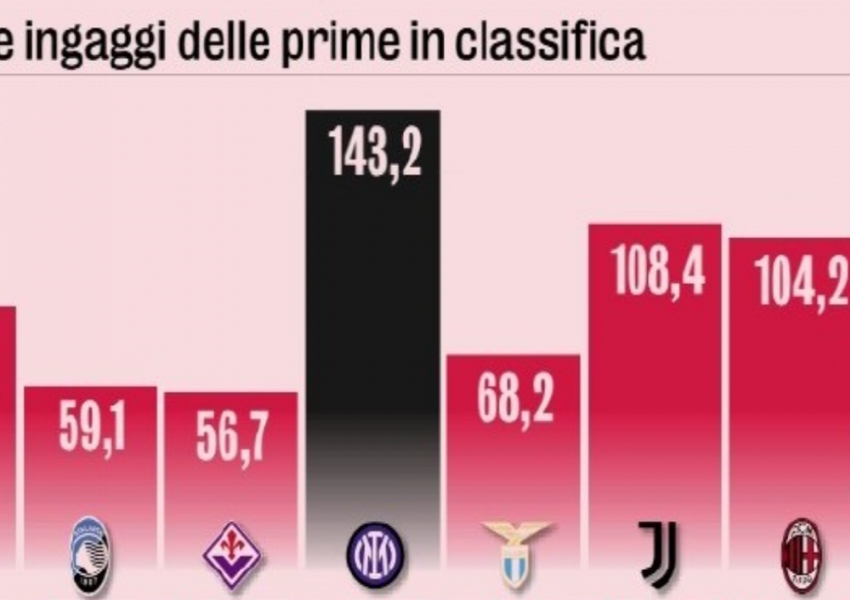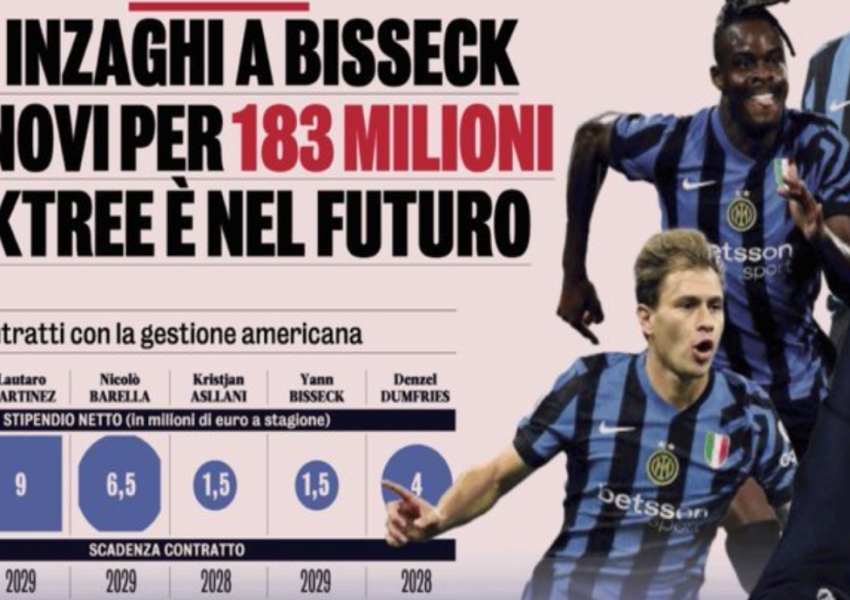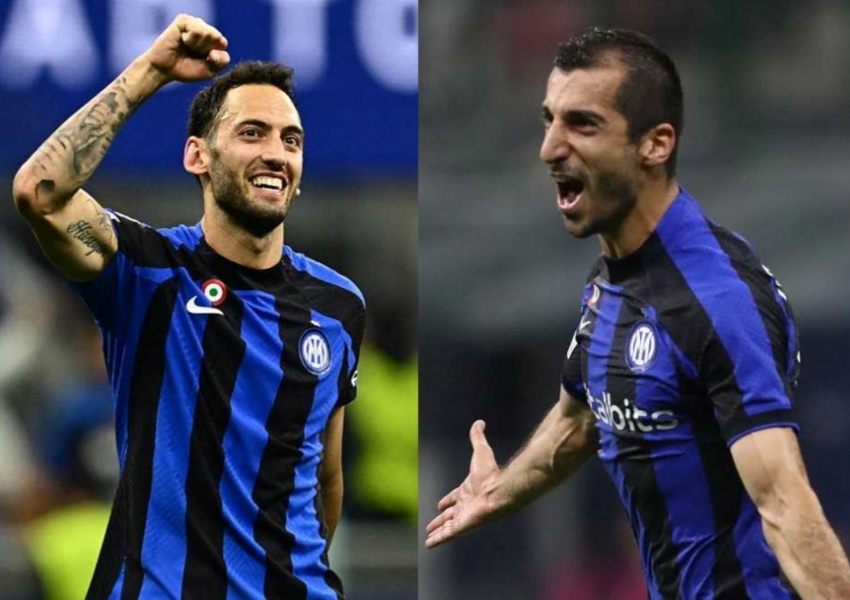Oaktree Capital Demands Major Salary Cuts at Inter Milan: Strategic Shift on the Horizon
Inter Milan’s financial landscape is undergoing a seismic shift under the guidance of Oaktree Capital. Reports from La Gazzetta dello Sport reveal that the American private equity firm, which holds significant influence at the club, considers Inter’s wage bill to be excessively high and is pushing for substantial reductions. Inter's gross annual salary expenditure this season stands at €143.2 million (net €86.5 million), surpassing Juventus (€108.4 million), AC Milan (€104.2 million), and Napoli (€82.9 million). The figure dwarfs Atalanta’s €59.1 million, showcasing the disparity in salary structures within Serie A.

With revenue growth within Serie A proving difficult to achieve, Oaktree views cost control as a pragmatic approach. Industry experts speculate that the "substantial" reduction being demanded could amount to at least 20%, a figure that would reshape Inter’s salary structure. However, this directive appears at odds with recent contract renewals that have raised eyebrows, fueling debates about the financial policies being implemented at the club.

Conflicting Signals: Renewals and Wage Caps
In the months following Oaktree’s involvement, Inter completed high-profile contract renewals for key figures such as Simone Inzaghi, Lautaro Martínez, Nicolò Barella, Kristjan Asllani, Benjamin Bisseck, and Denzel Dumfries. The total value of these six contracts reportedly reaches €183 million, leading some fans to label Oaktree as overly generous, comparing them to former Inter benefactors like Roman Abramovich or Massimo Moratti.

One renewal that has sparked debate is Lautaro Martínez’s five-year deal, which comes with a gross cost of €83.5 million in wages. Critics argue that contracts of this magnitude challenge the club’s stated desire to reduce salary expenditure. Yet, La Gazzetta dello Sport provides clarity, highlighting a nuanced strategy underpinning Oaktree’s financial vision.
The Bisseck Blueprint: A Win-Win Approach
According to the report, the key to understanding Inter’s new direction lies in the profile of Benjamin Bisseck. The young center-back, who recently signed a contract extension until 2029, exemplifies the dual objectives of Oaktree’s strategy: salary increases tied to on-field performance and growth in market value.
Bisseck’s contract aligns with Oaktree’s philosophy of creating a “win-win equation.” Players whose market value appreciates alongside their salaries contribute to enhancing the club’s overall asset value. This principle marks a departure from Inter’s previous reliance on aging, high-wage free agents and signals a shift toward younger, more economically sustainable talent.
Aging Stars: A Strain on Inter’s Wage Bill
Inter’s current wage structure reflects a significant burden from older players with limited resale value. Among the 12 highest earners in the squad, seven are over the age of 30: Hakan Çalhanoğlu, Piotr Zieliński, Stefan de Vrij, Mehdi Taremi, Henrikh Mkhitaryan, Marko Arnautović, and Yann Sommer. These players command a substantial portion of the club’s wage bill but offer little in terms of long-term financial return.
Notably, five of these seven were signed on free transfers, a market strategy that typically involves higher salaries as compensation for the lack of transfer fees. While this approach has helped bolster the squad in the short term, it clashes with Oaktree’s emphasis on asset value and resale potential.
Shifting Transfer Strategies
To meet Oaktree’s demands for salary reductions, Inter may need to overhaul its transfer policy. In contrast to past deals for players like Çalhanoğlu and Mkhitaryan, the club is now prioritizing acquisitions like Benjamin Bisseck and summer signings Josep Martínez and Facundo Palacios.
Both Martínez and Palacios were signed with relatively low wages and high potential for growth. Although the duo has accumulated just 10 minutes of Serie A playing time between them, their profiles align with Oaktree’s vision for a sustainable financial model. Should these players develop into first-team contributors and increase in value, they would represent the ideal outcome under the new strategy.
Challenges and Adaptation
Implementing this paradigm shift will not be without its challenges. Inter’s reliance on experienced free agents has been a hallmark of their squad-building approach in recent seasons, and transitioning to a model focused on younger, resale-friendly talent requires both time and patience.
Moreover, the coaching and managerial staff must adapt to the new guidelines, balancing the immediate need for results with the long-term goal of financial sustainability. This balancing act will test Simone Inzaghi and his team, particularly as they navigate a competitive Serie A and European campaign.
Oaktree Capital’s commitment to reducing Inter’s wage bill while increasing asset value is clear. The success of this strategy, however, depends on the club’s ability to execute smart transfers, nurture young talent, and phase out reliance on aging, high-wage players. With the groundwork laid, the coming seasons will reveal whether Inter can adapt to this new reality and thrive under Oaktree’s guidance.
Copyright Statement:
Author: mrfootballer
Source: Mrfootballer
The copyright of this article belongs to the author. Reproduction is not allowed without permission.
Recommended Blog
- UEFA Nations League: Tonali Thrives in Italy’s Colors, England Clears Path to Promotion
- Italy's Unexpected Choice for the No. 10 Role Shines: Barella Outclasses Belgium’s €90M Stars
- J1 League Round 29: Jubilo Iwata Must Attack, Kashima Antlers Face a Favorable Opponent
- The Master Technician: Taremi's Trademark Skills Shine, but Inter Milan Left Wanting
- UEFA Champions League Matchday 4: Real Madrid’s Healing Process and Liverpool’s Reassurance Without Alonso
- Inter Milan’s Iranian Striker Faces Two-Month Goal Drought: Criticism Fair or Unjust?
- Serie A Matchday 11: Lazio on Fire, Parma Eye Solutions Against the Bottom Club
- Inter Milan's Triple Milestones: Assist King Shines as Europe’s Fourth Best, Adding Drama to Arsenal Showdown
- Premier League Round 10: Can Manchester United Maintain Their League Cup Firepower? Will Spurs Capitalize on Home Advantage?
- Inter Milan’s Declining Superiority: The Vanishing Impact of Substitutes
Hot Blog
- Man City’s 21-Year-Old Star Returns Home as a Hero! Receives $350,000 Mercedes, Gifts It to His Father
- AFC Champions League Quarterfinal Draw: Yokohama Faces CR7! Two High-Stakes Clashes as Japan’s Duo Battle in the Bottom Half
- 175 Days on the Sidelines! Barça’s 32-Year-Old Guardian Dreams of a Champions League Comeback
- English Media: Manchester United Will Win Premier League Title in 2028! History Will Repeat Itself, Two Teams Serve as Inspirations
- 4 AM Showdown: Barcelona's Revenge Match! Win = 3-Point Lead Over Real Madrid, Key Players Rested
- 0-2 Double Defeat! China National Team Stuck at 6 Points: No More Direct World Cup Hopes, Two Crucial Matches Ahead
- China National Football Team Drops 13.6 Points, Slips to 94th in FIFA Rankings: Syria Overtakes, New 9-Year Low
- 0-0 Draw! Japan 12 Shots, 2 Missed One-on-Ones: 8 Matches, 20 Points, Group Winner, Saudi Arabia Stuck at 10 Points in 3rd
- 4-1, Double Win Over Brazil! Argentina Celebrates: World Cup Qualification Secured, 4th Team Globally to Qualify
- Real Madrid Got Lazy: 7 Kilometers Less Running in UCL! Two Superstar Spectators While Barça Outruns Them All